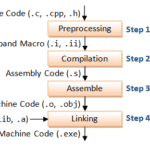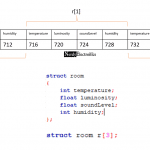Table of Contents
In the world of embedded systems, memory and resource constraints make it essential to optimize code for efficiency and performance. Conditional compilation is a powerful technique that allows you to include or exclude specific code blocks during the compilation process, enabling you to target different hardware configurations, platforms, or feature sets. This tutorial will guide you through the intricacies of conditional compilation in embedded C programming, providing practical examples and explaining how to view the preprocessor-generated files.
Why Conditional Compilation in Embedded Systems?
Embedded systems often have to accommodate varying hardware configurations, memory limitations, and platform-specific requirements. Conditional compilation enables you to tailor your code to different constraints, without having to maintain multiple code bases. By leveraging preprocessor directives, you can optimize your code for different microcontrollers or development boards, as well as for debugging and production environments.
Preprocessor Directives for Conditional Compilation
The most common preprocessor directives used for conditional compilation in embedded C programming are #if, #ifdef, #ifndef, #else, #elif, and #endif. Let’s explore each of these directives and their roles.
#if, #else, and #elif
The #if directive is used to test a specific condition, while #else and #elif are used in conjunction with #if to handle alternative conditions. Here’s an example:
#if defined(STM32F4)
// STM32F4-specific code
#elif defined(STM32F7)
// STM32F7-specific code
#else
// Generic fallback code
#endif
In this example, if the STM32F4 macro is defined, the STM32F4-specific code will be compiled. If not, the STM32F7 macro is checked, and if it’s defined, the STM32F7-specific code is compiled. If neither macro is defined, the code under #else will be compiled.
A very important part here is to understand the #define preprocessor directive. Read about it here – How to use #define Macros in C – NerdyElectronics
#ifdef and #ifndef
The #ifdef and #ifndef directives are used to check if a macro is defined or not. The #ifdef directive is short for “if defined,” while #ifndef is short for “if not defined.” They are commonly used to prevent header files from being included multiple times. Here’s an example:
#ifndef MY_HEADER_H #define MY_HEADER_H // Your header file contents #endif
In this example, if MY_HEADER_H is not defined, the contents of the header file will be included, and the macro will be defined to prevent further inclusion.
Practical Examples for Embedded Systems
Debugging and Production Modes
Conditional compilation can be used to include debugging code only when needed, ensuring a lean and efficient production build:
#define DEBUG_MODE
#ifdef DEBUG_MODE
#define DEBUG_PRINT(msg) printf("%s\n", msg)
#else
#define DEBUG_PRINT(msg)
#endif
int main() {
DEBUG_PRINT("Debug message");
return 0;
}
In this example, when the DEBUG_MODE macro is defined, the DEBUG_PRINT function will print debugging messages. In the production build, simply comment out the DEBUG_MODE macro to disable debug messages.
Feature Selection for Different Hardware
You can use conditional compilation to enable or disable features based on the target hardware’s capabilities:
#ifdef ENABLE_I2C
#include "i2c_driver.h"
#endif
int main() {
#ifdef ENABLE_I
i2c_init(); // Initialize I2C on supported hardware
#endif
// Rest of your code
return 0;
}In this example, if the ENABLE_I2C macro is defined, the I2C driver will be included, and the I2C initialization function will be called. If the target hardware does not support I2C, simply comment out the ENABLE_I2C macro to disable the I2C-related code.
Generating and Inspecting Preprocessor Output
You may want to inspect the output of the preprocessor to see how your conditional compilation affects the code. Most compilers provide an option to generate the preprocessor output. For the GCC compiler, you can use the -E option to generate the preprocessed file:
gcc -E main.c -o main_preprocessed.c
This command will preprocess the main.c file and save the result as main_preprocessed.c. You can then open this file to see how the preprocessor directives have been processed and the resulting code.
Best Practices for Conditional Compilation in Embedded Systems
To make the most out of conditional compilation in embedded C programming, follow these best practices:
- Keep conditions simple: Complex conditions can make your code hard to read and maintain. Stick to simple and easily understandable conditions for better readability.
- Use feature testing macros: Instead of relying on platform or hardware-specific macros, use feature testing macros to enable or disable features based on their availability.
- Avoid excessive nesting: Deeply nested preprocessor directives can be confusing. Keep the nesting levels to a minimum and use comments to explain your code.
- Use include guards: Prevent multiple inclusions of header files using #ifndef and #define directives to avoid potential compilation errors.
Conclusion:
Conditional compilation in embedded C programming is a valuable technique that enables you to optimize your code for different hardware configurations, platforms, and environments. By mastering preprocessor directives like #if, #ifdef, #ifndef, and their usage, you can create more efficient, portable, and maintainable code for your embedded systems projects. Follow the best practices to ensure your conditional compilation remains clean and efficient. Happy coding!
Hi, I’m Vivek, a Senior Embedded Innovation Specialist. I have been working on Embedded Systems and IoT for the past 11 years. I love to share my knowledge and train those who are interested. Nerdyelectronics.com was started out of this interest. You can read my full profile in this link.







